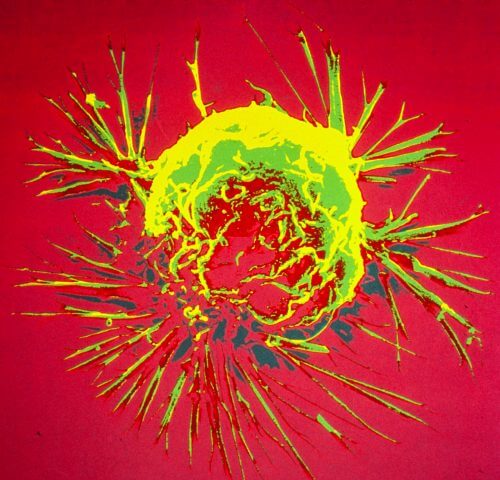A new study conducted at the University of Haifa and published in the prestigious journal Cell death and disease, found that luminal breast cancer cells can be reversed A, for cells simulating healthy breast tissue cells by the expression of the receptor beta 3 integrin.

"Not only did we find that the expression of the receptor 'returns' the cells to an almost normal state, we also found the pathway that undergoes silencing following the expression of the receptor - which opens the door for us to examine whether silencing of this pathway in other types of breast cancer in which it is present will lead to the same results, including in Breast cancer that has developed resistance to conventional treatments," said Dr. Dalit Barkan, head The laboratory for the study of dormant breast cancer metastases at the university.
Breast cancer is a common disease mainly among women from western countries and is the second cause of death among all women suffering from cancer. Luminal type cancer A It is the most common among breast cancers and is characterized by the expression of receptors for the hormones estrogen and progesterone. The currently accepted treatment for this type of cancer is hormonal therapy and it leads to a 90% chance of survival for the patients for 10 years, however, in cases where the disease returns after 10 years, it is usually much more violent and hardly responds to the existing treatments, therefore the recurrence of the disease is the main factor for mortality among patients with this type of cancer. "In the recurrence of the disease, there is a decrease in the drug reactivity of the cancer cells to hormonal treatment and even in some cases to chemotherapy treatment, therefore there is a paramount importance in finding new therapeutic strategies to treat those cancerous tumors that tend to return and change their appearance and we actually do not currently have the tools to deal with them," said Dr. Barkan .
In the current study, which was led by research student Hanan Abu Tayya, under the direction of Dr. Barkan, and an international team of researchers from Germany, the USA, Singapore, and the Faculty of Medicine at the Technion, the researchers sought to test the role of the receptor beta 3 integrin At the various stages in the progression of luminal breast cancer A. According to the researchers, the beta 3 integrin It has been recognized in cancer research for a long time, and it is even recognized in different types of the disease as one whose expression is actually related to the ability to invade other tissues. Therefore, there are studies that even suggest inhibiting the action of the receptor, as part of the process of fighting cancer and its metastases. However, in a preliminary study by Dr. Barkan, it was found to her surprise that the expression of the receptor leads to the differentiation of cancer cells in this specific type of cancer intoacinar-like structure, cells that mimic healthy breast tissue cells. "Since cancer research is increasingly leaning towards personalized treatment for the patient and the type of cancer, we wanted to check if in the case of luminal breast cancer A The role of receptor expression can be positive," said Dr. Barkan.
In the first stage, the researchers took biopsies of women with luminal breast cancer, at different stages of the disease's progression, and saw that the receptor beta 3 integrin manifested in those biopsies that were sampled at a very early stage of the development of the disease, a stage called still benign, while with the appearance of the tumor, the receptorbeta 3 integrin It is not manifested at all and it is manifested again in the same biopsies that were sampled in very invasive stages, especially when the disease becomes metastatic. But at this stage it is mainly expressed in the tissue surrounding the tumor and little in the tumor itself. When the researchers induced the expression of the receptor in several luminal breast cancer cell lines, they saw that the cells turned back into normal breast tissue cells with the ability to even produce milk. Also, their very differentiation back into 'normal' cells stopped their division. This differentiation was also observed when the same cells were injected into a murine model.
At this stage, the researchers focused on finding an intracellular signaling mechanism that mediates the action of the receptor and found that the signaling pathway through a protein called Notch-4 undergoes silencing upon expression of the receptor beta 3 integrin. Indeed, when this cellular pathway was silenced in another way - regardless of receptor expression - they saw that even then the cancer cells began to differentiate back into normal tissue cells. That is: silencing a track of Notch-4 It is the one that causes the normal differentiation of the cells. They even identified the specific subpopulation of cancer cells that respond to the silencing of the intracellular pathway - a group of progenitor cells cancer luminal progenitor-like cells)) which are descendants of the cancer stem cells. According to them, this finding is of great importance for the future, because it opens the door to the thought that silencing this pathway in other types of breast cancer where the same subset of progenitor cells exists can cause their normal differentiation there as well.
"Our findings reinforce the importance of tailored medicine for the treatment of breast cancer - there are types of breast cancer in which the expression of the receptor beta 3 integrin is a negative factor and causes an accelerated development of the disease, however, in other types of breast cancer such as luminal breast cancer, the same intracellular pathway that we found, which mediates the differentiation of the cells by the receptor, is silenced beta 3 integrin, can actually have a positive effect, so we must try and see how we can lead to the silencing of this pathway directly", concluded Dr. Barkan.
